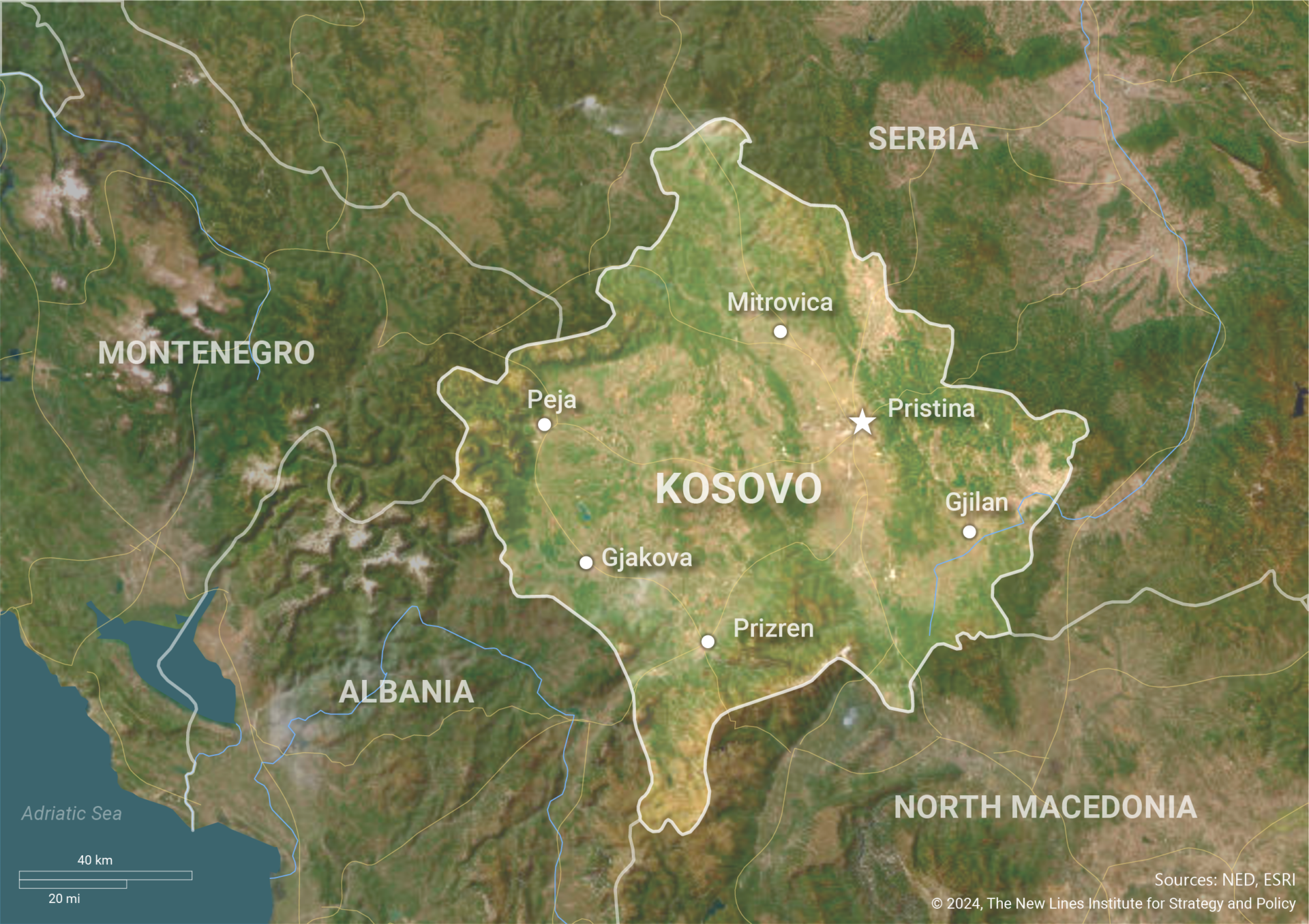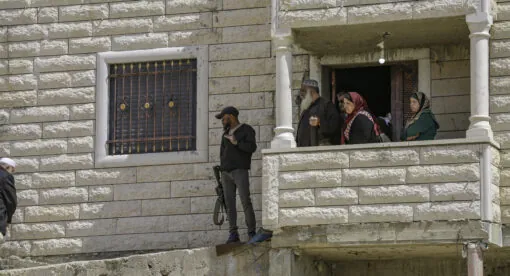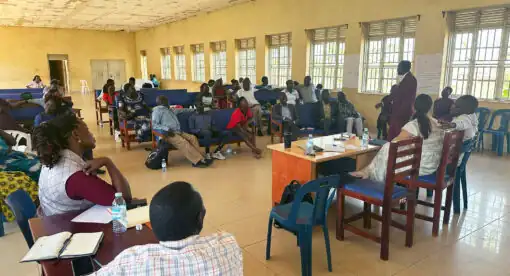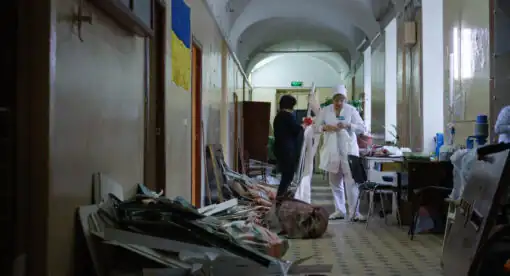Introduction
Growing ethnic tensions in Kosovo have prompted changes in the country’s security landscape in recent years, leading to shifts in the roles of the Kosovo Police, Kosovo Security Force (KSF), and NATO’s Kosovo Force (KFOR). Kosovo’s defense and law enforcement apparatus has evolved, from the legal frameworks governing the Kosovo Police’s autonomy to strategic advancements in the KSF. The country is particularly seeing ethnic tensions in the north, where a terrorist attack on the village of Banjska in September 2023 has had severe repercussions.
The delicate balance among Kosovo’s aspirations for NATO membership, evolving regional dynamics, the enduring Kosovo-Serbia dispute, and the intricacies of community trust in the Kosovo Police are crucial to understanding the country’s challenges. The complexities surrounding the integration of the north into Kosovo’s security framework and the effect of trust disparities on law enforcement underscore the nuanced nature of regional security issues. How the international community – particularly NATO and the EU – responds to growing tensions and security challenges in Kosovo matters for the stability of the entire Western Balkans.
Kosovo’s Evolving Security Landscape
Kosovo’s security situation remains complex, exacerbated in recent years by persistent ethnic tensions. The November 2022 resignations of the mayors of the ethnic Serbian majority municipalities North Mitrovica, Zvecan, Leposavić, and Zubin Potok, followed by the swearing in of their ethnic Albanian replacements in April and May 2023, sparked the most recent increase in tensions. The United States, France, Italy, Germany, and the United Kingdom, commonly referred to as the Quint, issued a joint public statement condemning “Kosovo’s decision to force access to municipal buildings in northern Kosovo despite our call for restraint.” A few days after this statement, the NATO-led KFOR peacekeeping force in Kosovo reported its troops sustained injuries during clashes with ethnic Serbs who were attempting to take over municipal offices. The United States announced punitive measures against Kosovo for disregarding its advice to avoid escalating tensions, criticizing its use of force and barring it from joining a U.S.-led military exercise in Europe.
There were other warnings about the potential for violence and destabilization in northern Kosovo from civil society reports. A scenario-planning exercise by civil society in Kosovo had forecast these developments more than a year before the Sept. 24, 2023, Banjska attack, which represented a culmination of the growing tensions. Masked gunmen ambushed a police patrol, killed one officer and injured another. Milan Radojičić, the deputy leader of the Serb List, the largest party representing Serbs in Kosovo, publicly claimed responsibility for the attack. U.S. Ambassador to Kosovo Jeffrey Hovenier said an organized structure or entity seemed to be behind the attack, and the European Parliament approved a resolution calling it a terrorist attack and demanding accountability from Serbia.
The Banjska attack and the prevailing instability in the north of Kosovo serve the strategic interests of Russia, aligning with its active efforts to undermine the influence of the EU, U.S., and NATO in the Western Balkans. Russia aims to impede the integration of the region into the EU and NATO and to divert attention from Ukraine by creating new conflicts. Ukrainian President Volodymyr Zelenskyy has publicly asserted that “Russia is preparing for war in the Balkans.” Central to Russia’s agenda is the exposure of NATO as a weak security actor and the portrayal of the EU as an unreliable partner. The situation in Kosovo, particularly in the north and its close ties with Serbia, presents an opportunity for Russia to advance its interests.
Ongoing disputes with Serbia and the persistence of ethnic tensions in the north, including issues related to vehicle registration plates and identity cards, continue to strain relations, diverting attention from broader governance, economic, and human security concerns shared by Kosovar Albanians and Serbs.
A strong sense of hopelessness pervades Kosovo with respect to a sustainable and meaningful resolution of the dispute with Serbia and integration of the Serbian community. A survey conducted in early 2023 by the International Republican Institute found that 25% of Kosovars believe Kosovo is further away from normalizing relations with Serbia than it was two years ago, while 34% perceive no change. A small yet notable number (11%) of Kosovars hold a pessimistic view, believing that Kosovo will never normalize relations with Serbia. More than half of the population (56%) expresses concern, ranging from somewhat worried to very worried, that current tensions with Serbia could escalate into violence, highlighting the widespread anxiety about the potential for a resurgence of hostilities and the fragile state of peace in the region. Furthermore, according to the Security Barometer from the Kosovar Centre for Security Studies, 21% of Kosovars believe that a war with Serbia is somewhat or very likely, while 41% think the dialogue for normalizing relations between Kosovo and Serbia is not progressing in the right direction.
The developments in the north of Kosovo have had an impact on the interethnic relations in the country’s south as well, where the Serbian community is considered more integrated compared to the north. However, there is a looming risk that the Albanian-majority community will target the vulnerable Serb minority in southern Kosovo as ethnic scapegoats if ethnic tensions in the north persist and violence returns.
Kosovo in July 2022 approved the Security Strategy 2022-2027, which outlines four vital interests: protection of sovereignty and territorial integrity, upholding constitutional order and public safety, ensuring human security and social development, and integration into Euro-Atlantic structures and other international mechanisms. The Security Strategy further states that Kosovo is committed to constructive cooperation with neighbors, notably Serbia, based on reciprocity and holds that Serbia’s growing militarization poses a threat to Kosovo and the region.
In January 2021, the Kosovo Assembly unanimously approved a government proposal to deploy KSF members in international peacekeeping missions under the U.S. Central Command, following a U.S. invitation. Three months later, Kosovo sent a military platoon to Kuwait for its first international peacekeeping mission, with troops serving under the command of the National Guard of Iowa. A ceremony in Pristina, attended by top leaders and Western military attaches, marked the deployment. Kosovo saw the occasion as an important milestone marking its contribution to international peace efforts. This participation marks a significant step for Kosovo in gaining international recognition and legitimacy, allowing the country to demonstrate its commitment to Western-led security norms and values, enhancing its stature and credibility both on the international stage and with its key strategic ally, the United States. By engaging constructively in international security operations, Kosovo can indirectly contribute to easing regional tensions and fostering a more favorable environment for dialogue and normalization of relations with Serbia.
Challenges in Kosovo’s Policing
The Kosovo Police, with an estimated 8,000 personnel, operates within the framework of Law No. 04/L-076, adopted by the Kosovo Assembly in 2012. This comprehensive law delineates the authorizations, duties, and organizational structure of the force and establishes the guiding principles for its activities. Police officers also must adhere to the Police Code of Ethics. As a public service entity, the Kosovo Police functions within the Ministry of Internal Affairs, employing a unified chain of command that spans Kosovo’s entire territory, though operational management rests under the direct control and supervision of the general director of the Kosovo Police. The Ministry of Internal Affairs’ authority does not extend to operational aspects, emphasizing the police’s day-to-day autonomy.
Financial autonomy is a crucial aspect of this independence. The Kosovo Police operates with its own budget, distinct from within the Ministry of Internal Affairs, and the general director is entitled to prepare the police budget independently. This budget is then submitted to the minister for review and further processing, adhering to established legal procedures.
The First Agreement of Principles Governing the Normalization of Relations, reached in 2013, included the dissolution of parallel Serb police structures in the north of Kosovo, integrating personnel into the Kosovo Police, and terminating salary payments from the Serbian budget. An Implementation Plan, introduced in May 2013, set the integration timeframe. Serbia closed police stations in July 2013, handing over equipment under a verification process led by the European Union Rule of Law Mission to Kosovo (EULEX). The Serbian government included personnel in an early retirement scheme, maintaining 60% of their salary as a pension. Serbia continues health insurance until Kosovo develops its health coverage.
Kosovo introduced the Law on Amnesty (September 2013) to facilitate the integration of Serb police personnel. In July 2013, the Police Regional Directorate covering four northern municipalities was established, and a Kosovar Serb was appointed as director for North Mitrovica. By late 2013, Kosovo Police integrated 287 former Serbian police members. A one-week orientation training familiarized them with the Kosovar legal system. Integration faced challenges, with some Serbian candidates for officer positions not passing background checks or refusing to sign a loyalty declaration. The Serbian police’s civil administration was also integrated into Kosovo institutions. With this integration, Kosovo Police became the sole law enforcement agency operating throughout the country. Despite improvements in the security situation and a reduced number of ethnic incidents, other challenges like the language barrier and civil registration persist.
Kosovo’s security situation, particularly in policing the north, faces two primary challenges: reintegrating the north into Kosovo’s security framework and navigating trust issues with the local community. Addressing the first challenge, it’s noteworthy that the 2013 agreement between Kosovo and Serbia initially achieved important results in integrating the north into Kosovo’s security apparatus, consolidating the Kosovo Police as the exclusive security entity across the entire country. However, integration in northern Kosovo encountered a setback with the mass resignations of November 2022.
The situation in northern Kosovo has the potential to further deteriorate. The police resignations created a major security vacuum currently being filled by enforcers linked to organized crime groups. There also is the potential for infiltration of troops from Serbia under the pretense of maintaining order. An investigative report by a Kosovar news outlet has shed light on a concerning development in the northern municipalities of Kosovo, where illegal taxi drivers with Belgrade license plates are engaging in surveillance activities against Kosovo police officers. These drivers, equipped with gear usually reserved for law enforcement, have been linked to Radojičić, the suspected mastermind of the Banjska attack and primary suspect in the 2018 killing of Kosovo Serb politician Oliver Ivanović.
This gains additional significance against the backdrop of the 2013 agreement aimed at integrating parallel security organizations in the north of Kosovo into the Kosovo Police. The 2013 agreement was supposed to dismantle organized crime groups like Civil Protection (Civilna Zaštita) and the North Brigade (Severna Brigada), with their members joining the Kosovo Police. However, the mass resignation of Kosovo Serbs in the north from the police force in 2022 has led to widespread belief that these individuals have returned to their original, illicit activities under the guise of these organizations, as evidenced by the Kosovo government’s recent designation of these groups as terrorist organizations.
The Kosovo government bolstered the deployment of specialized police units in the north, citing escalating tensions and an effort to combat organized crime. These measures have yielded significant results over the past two years, effectively disrupting the crime networks. A major development in this endeavor was the arrest of Milun “Lune” Milenković, a prominent figure in organized crime in northern Kosovo and the purported leader of the illicit “Civil Protection” group. Milenković was suspected of orchestrating attacks against NATO peacekeepers in late May. Kosovo Police also seized a lavish villa belonging to Radojičić.
Nonetheless, the heightened presence of specialized police units has created serious concerns within the local Serbian population in the north. In May 2023, concerns arose over the expropriation of land for a planned Kosovo Police station in Leposavić and Zubin Potok. Residents, highlighting potential violations of expropriation laws, have protested these plans and blocked access to the construction site with heavy machinery. The EU Office in Kosovo questioned the lack of clarity in the government’s decision and demanded transparency. Kosovo Ombudsperson Naim Qelaj visited the residents of Leposavić to assess the situation regarding land expropriation before reviewing three complaints he received. In the meeting, he noted the complaints of the citizens about lack of transparency in the government’s decision and their concerns about the lawfulness and implementation of legal procedures.
The situation remains sensitive, emphasizing the need for legal procedures and adequate compensation for locals, as well as communication challenges for the government with the local Serbian population. Essentially, maintaining a high presence of specialized policing units in the north of Kosovo is not a sustainable approach, and the government must find a more durable solution that recognizes the needs of the local community in the north.
According to the 2022 Security Barometer by the Kosovar Centre for Security Studies, trust in the Kosovo Police varies significantly between different ethnic communities. While 77% of Kosovar Albanians express trust or complete trust in the Kosovo Police, only 14.2% of Kosovo Serbs share a similar level of confidence. A majority of Kosovo Serbs, approximately 60%, indicate little or no trust at all. Recent events in northern Kosovo may have exacerbated this decline in trust.
The substantial trust disparity among ethnic communities highlights a crucial challenge for the Kosovo Police, particularly in fostering a sense of security and cooperation among Kosovo Serbs. Addressing this issue is vital for several reasons. First, effective policing relies on community trust, cooperation, and the active involvement of all citizens. A lack of trust can hinder the police’s ability to prevent and solve crimes. Second, trust-building is essential for maintaining public order and preventing the escalation of tensions, especially in ethnically sensitive areas like the north of Kosovo. The recent decline in trust among Kosovo Serbs may be linked to specific incidents or perceptions, making it imperative for the Kosovo Police to understand and address these concerns. Third, a disparity in trust levels can impact the legitimacy of the Kosovo Police in the eyes of the entire population. Building trust is not only a matter of effective law enforcement but it also contributes to the broader goals of community cohesion and the establishment of the rule of law. This is especially important for the efforts of the Kosovo Police and the government to fight organized crime in the north of Kosovo.
Kosovo Security Force, NATO, and Regional Stability
The KSF, an estimated 4,500-strong institution, has evolved from crisis management to a cornerstone of Kosovo’s defense and security architecture since its establishment in 2008. In 2018, the Kosovo Assembly amended legislation to elevate the mandate of the lightly-armed KSF to that of an army in a vote that Kosovo Serb members of the Assembly boycotted. NATO Secretary General Jens Stoltenberg expressed regret over the law despite NATO’s concerns, acknowledging that the transition is within Kosovo’s prerogative but calling the timing inappropriate.
In recent years, and especially since Prime Minister Albin Kurti took office in 2021, Kosovo’s defense budget has increased significantly. The KSF budget for 2024 is planned to be around 200 million euros, which represents over 2 percent of the country’s GDP and a significant increase when compared to previous years. At the start of 2022, Kurti announced the establishment of the Security Fund, inviting the business community, diaspora, and citizens to contribute. The establishment of the fund, according to the government, was necessary in the wake of Russia’s brutal invasion of Ukraine. The Security Fund remains shrouded in secrecy, with minimal information available regarding the accumulated amount and its designated purposes. The Ministry of Defense of Kosovo asserts that the fund will be allocated to fulfill its primary objective: ensuring the safety of citizens and territorial defense.
In 2021, the United States donated 55 armored security vehicles to Kosovo, and the KSF used its annual military allowance of 9.7 million euros from the Turkish government to purchase 14 armored vehicles from Turkey, including four Vuran-type and 10 KIRPI-type vehicles equipped with weapons. Additionally, in 2023, Kosovo received Turkish Bayraktar TB-2 drones. However, NATO’s KFOR mission publicly emphasized its primary authority over Kosovo’s airspace, implying that the drones cannot be used without its consent. Despite NATO’s stance on the drone acquisition, Kosovo’s defense modernization arguably reflects an important step toward NATO membership.
NATO has been the leading security mechanism in Kosovo since 1999 through KFOR. However, following the declaration of independence by Kosovo in 2008, NATO started to review its mission. It assisted in disbanding the Kosovo Protection Corps and establishing the KSF, and in 2009 it shifted KFOR’s posture toward deterrence. The NATO Advisory and Liaison Team (NALT), formed in 2016, provides practical support to the KSF and cooperates with the Ministry of Defense. With a focus on areas like logistics, procurement, and cyber defense, NALT plays a key role in enhanced interaction with Kosovo, aligning with the nation’s aspirations for advanced relations with NATO. Kosovo’s government sees access to NATO’s Partnership for Peace and, ideally, a Membership Action Plan, as essential incentives for compromising with Serbia on Serb-majority municipalities in Kosovo.
Amid heightened tensions and violence in the north of Kosovo, particularly after the Banjska attack, NATO has bolstered its peacekeeping force with “combat power.” Following the incident, a battalion of 200 troops from the United Kingdom and 100 from Romania within KFOR have been equipped with heavier armament to enhance their combat capabilities. The shift in KFOR readiness and the evaluation of the security situation in Kosovo may impact NATO’s perception of Kosovo as a potential candidate for membership. This change could lead NATO to view Kosovo more as a source of crises rather than a rational actor contributing to regional stability.
The KSF is restricted from conducting missions in the north of Kosovo without the consent of KFOR. This arrangement, stipulated in a letter exchange in 2013 between Kosovo’s then-Prime Minister Hashim Thaçi and then-NATO General Secretary Anders Fogh Rasmussen, was a confidence-building measure. It affirmed that the establishment of the KSF does not pose a threat to the Kosovo Serbs in the north or the mandate of NATO/KFOR in Kosovo, aligning with NATO’s practical demands.
The equipment upgrades for the KSF and KFOR can also be contextualized against the backdrop of Russia’s invasion of Ukraine and its significant presence in Serbia, particularly within the country’s security institutions.
The prompt responses from NATO and Kosovo to the Banjska attack carry a clear message, especially aimed at countering destabilization efforts in Kosovo, which might be inspired by Russia using Serbia as a proxy. It also sends a clear message to Milorad Dodik, the leader of Republika Srpska in Bosnia and Herzegovina, who has made no secret of his plans to secede from BiH. In other words, how NATO and the EU respond to destabilizing efforts in Kosovo has regional relevance.
For, Kosovo, NATO membership is a vital interest, especially following the Russian invasion of Ukraine, increased Russian influence in Serbia, and Serbia’s interest in destabilizing the north of Kosovo. To achieve this goal, partnership with the United States is key. Since 2018, the United States has been supporting the KSF’s comprehensive 10-year transition plan 2019-2027 to develop a transparent, multiethnic, professional, and NATO-interoperable territorial defense force. U.S. assistance includes leading multilateral exercises to boost confidence in the KSF, building regional trust and relationships.
The path to NATO membership for Kosovo is complicated by political factors, including the non-recognition of Kosovo’s independence by four NATO member states. A potential comprehensive agreement with Serbia could alter this dynamic. However, Serbia appears uninterested in a sustainable resolution of the Kosovo dispute due to domestic nationalist pressures and the potential loss of relevance and appeasement from the EU that would come with resolving the issue.
One cost-effective way for NATO to send the right messages to Kosovo in the current context is to officially recognize and accredit a Centre of Excellence (COE) in Kosovo, such as the International Training Center for Search and Rescue in Pomozatin/Kosovo. COEs are organizations dedicated to training and educating leaders and specialists from NATO member states and partner nations. They play a crucial role in developing military doctrines, extracting insights from past experiences, enhancing the interoperability and capabilities of forces, and conducting experiments to validate new concepts. These centers are valued for their specialized knowledge and experience, contributing significantly to NATO’s ongoing transformation and ensuring that the alliance does not unnecessarily replicate existing assets, resources, and capabilities.
COEs typically focus on a specific area of expertise, providing authoritative knowledge in their respective fields. Despite their close relationship with NATO, COEs operate independently from NATO’s direct financial support and its command structure. They receive funding from individual or multiple nations and form part of a wider network that facilitates the sharing of information both within and outside NATO. The coordination and optimal use of COEs within NATO are overseen by the Allied Command Transformation in cooperation with the Supreme Allied Commander Europe. As of 2024, 28 COEs have been accredited by NATO in different countries.
Establishing a COE in Kosovo would provide specialized training and education for leaders and specialists, not only from Kosovo but also from NATO member and partner countries. This would enhance the capabilities and interoperability of Kosovo’s security forces with NATO standards. Accreditation of a COE in Kosovo by NATO would signify recognition, validation, and support, elevating Kosovo’s relations with NATO. By hosting a NATO-accredited COE, Kosovo would become a hub for international cooperation in its area of specialization. This would foster stronger relationships with NATO members and partner nations, facilitating the exchange of knowledge and best practices and fostering a collaborative security environment.
Conclusion
Kosovo’s evolving security posture reflects a dynamic interplay of internal and regional factors, as well as aspirations for NATO integration. The transformation of the KSF into a military institution, coupled with an increased defense budget and international support, underscores the nation’s commitment to bolstering its security. However, the absence of normalized relations with Serbia stands out as the paramount security concern, intensifying the security dilemma and fostering instability, particularly in the north of Kosovo. The ongoing crisis in the north has prompted Kosovo to deploy specialized police units in response to violence. While these units have effectively executed their mandates, their presence has failed to instill a sense of security among the local Serb population. Addressing the aftermath of the mass resignations of Kosovo Serb police officers is an urgent imperative. Rectifying this vacuum is essential not only to restore stability but also to rebuild trust and confidence within the affected communities. Swift and comprehensive action is crucial to mitigate the repercussions of this security gap.
Recommendations for Policymakers:
- Strengthen partnerships: Kosovo should foster international partnerships and secure support for defense modernization. Kosovo must increase engagement with NATO and coordinate any response to the security concerns emanating from the north of Kosovo and relations with Serbia.
- Address the challenges of the north of Kosovo: Develop a comprehensive strategy to reintegrate the north into Kosovo’s security framework, addressing trust issues and potential infiltration risks. Explore diplomatic avenues to mitigate tensions and seek solutions to enhance security without relying solely on a high presence of specialized police units. Policing the north with these units is not sustainable. It is urgent that the Kosovo government polices the region with members of the Serbian community.
- Engage the community and build trust: Prioritize community engagement, particularly with Kosovo Serbs to bridge trust gaps in the Kosovo Police. Implement measures to address concerns, improve public order maintenance, and enhance the legitimacy of law enforcement. Also, provide capacity development support for the KSF, such as in the field of cybersecurity.
- Increase Security Fund transparency: Ensuring that the fund’s allocation aligns with strategic security priorities will enhance public trust and provide clarity on how funds contribute to Kosovo’s defense capabilities.
- Prepare for potential destabilization: Develop contingency plans in collaboration with NATO and the international community to address potential destabilization efforts, especially in response to heightened tensions. This preparedness should include strategic responses to events like the Banjska terrorist attack, ensuring a robust defense against destabilizing influences.
- NATO should officially recognize and accredit a COE in Kosovo: The International Training Center for Search and Rescue in Pomozatin is a strong candidate to become a COE since it is already being used by NATO member states for capacity development. By accrediting a COE in Kosovo, NATO can make a cost-effective investment in strengthening its relations with Kosovo.
This essay originally appeared in the anthology “The Western Balkans 2024: Assessment of the Current Security Posture and Geopolitical Challenges.” To download the full anthology, click here.
Ramadan Ilazi is currently serves as the head of research at the Kosovar Centre for Security Studies. He holds a doctorate in politics and international relations from Dublin City University in Ireland, and a master of letters in peace and conflict studies from St. Andrews University in Scotland. Previously, Ilazi held the position of Kosovo’s deputy minister for European integration (2015-2016), where he was involved in supporting the process of preparing a national plan for the implementation of the Stabilization and Association Agreement with the European Union and developing the European Reform Agenda for Kosovo. His most recent book is “The European Union and Everyday Statebuilding: The Case of Kosovo” (Routledge 2022).
Leureta Lumi is a researcher at the Kosovo Center for Security Studies. She holds a master’s degree in international relations from Webster University in Geneva with a focus on the European Defense Community, as well as a master’s degree in diplomacy from the Geneva School of Diplomacy and International Relations with a focus on counterterrorism. Previously, Lumi served as an adviser to the minister of defense of the Republic of Kosovo, covering international cooperation.
The views expressed in this article are those of the author and not an official policy or position of the New Lines Institute.







